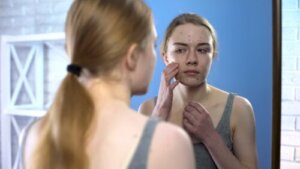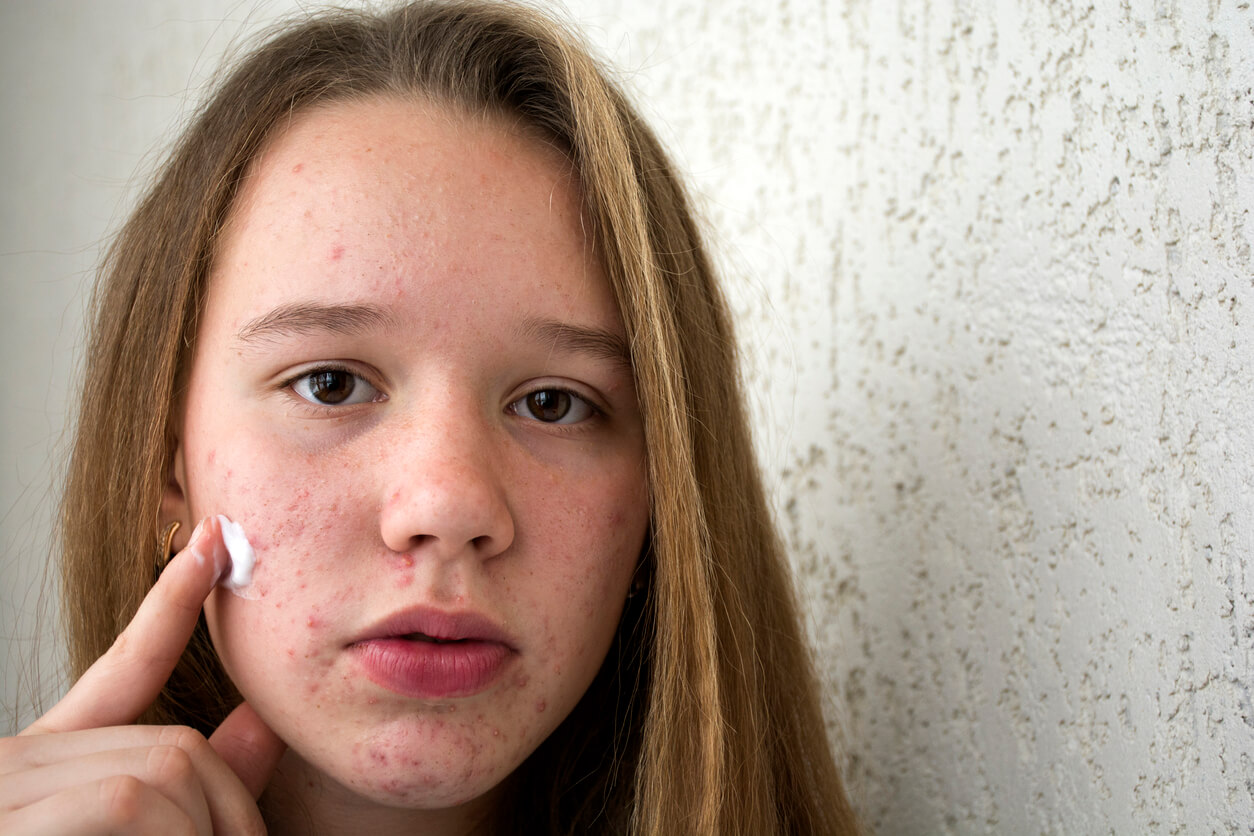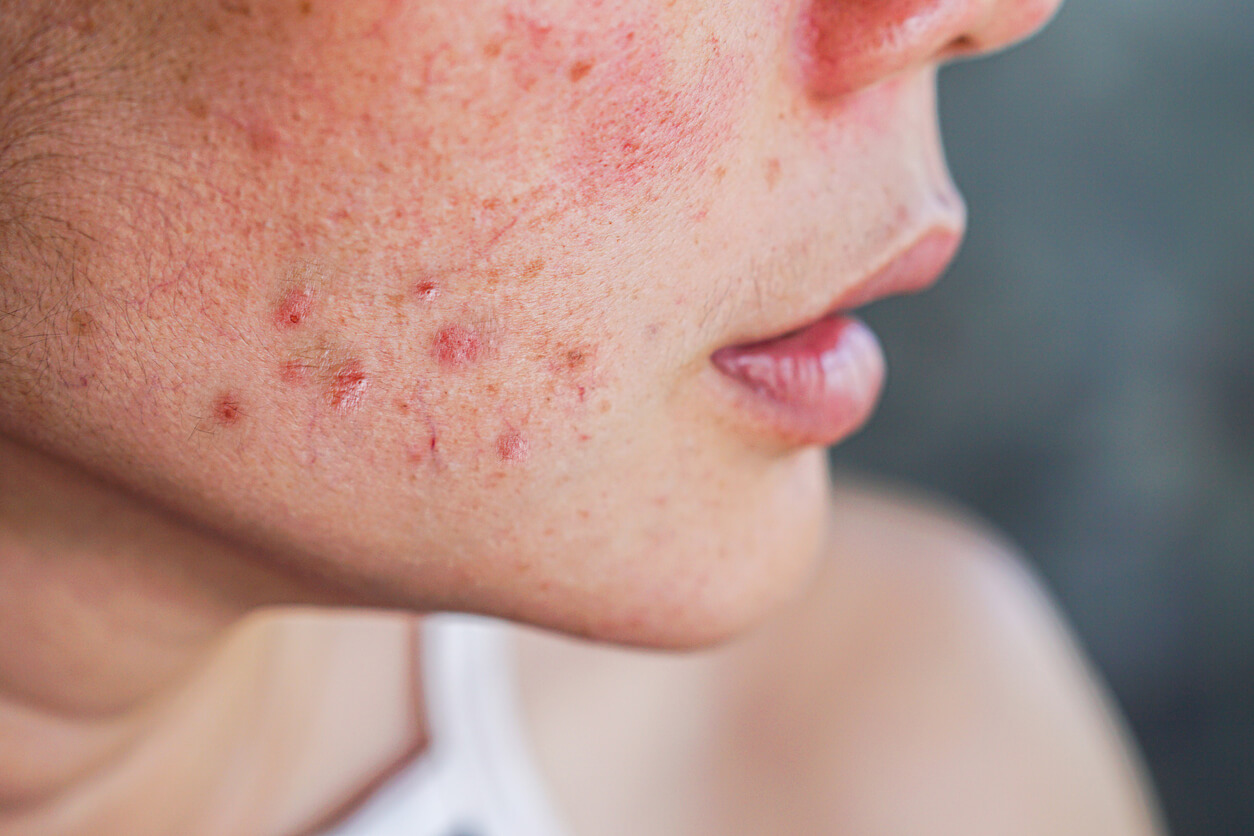The Effects of Acne on Self-Esteem

Acne doesn’t pass through the life of an adolescent without leaving a certain amount of discomfort. The truth is that skin diseases, such as pimples and blackheads, don’t come as a surprise once puberty begins. These affect most young people between the ages of 12 and 18, albeit with varying intensities. Keep reading to learn more about the effects of acne on self-esteem.
You’ll remember that anguish and discomfort you felt as a teenager when you woke up, looked in the mirror, and saw one, two, or thirty pimples that had broken out while you were sleeping. More than once, you may have stressed yourself out as you wondered about possible strategies to hide them. On the other hand, if you’re one of the lucky few who didn’t suffer from acne during your youth, you’ll have noticed how it affected most of your friends.
The emotional impact of skin lesions on the face of adolescents is considered significant. While the effects of acne vary according to personality traits and the quality of the support network, among other factors, imperfections or unwanted features negatively affect self-confidence to a greater or lesser extent.
A body that feels foreign

We know that adolescents seek, explore, and reaffirm their identity in the company of their peers. Clothing style, physical features, and even body movement represent relevant elements in the intermediate phase between childhood and adulthood.
This stage brings with it major hormonal changes that result in notorious body transformations. Thus, facial and genital hair appears, breasts grow, and the voice changes. The body erupts in such a way that the feeling of security and confidence is clearly interrupted and everything seems to fall apart. Recognizing oneself in a body that until then felt alien implies an arduous symbolic task.
In this regard, self-image presents important modifications because although the personality remains similar over time, we can’t say the same about the body.
The psychosocial effects of acne
Acne is an inflammatory disease of the pilosebaceous unit. It’s usually located in places where seborrheic sebaceous glands are abundant, such as the face, back, and chest. As we’ve said, it’s not an uncommon condition, but quite the contrary. It affects 91 % of adolescent males and 79 % of adolescent females. Although children and adults aren’t exempt from this skin disease, the percentage of occurrences is much lower.
Sometimes the growth spurt is accompanied by the dreaded and famous acne. And skin diseases often cause a lot of damage to self-esteem. In tune with other factors, it can even lead to more serious damage such as social anxiety or depression.
In general terms, the appearance of pimples or blackheads usually affects people’s emotional stability and leaves psychological after-effects associated with body image and self-esteem. The latter’s understood as the evaluative perception of oneself as a whole. For example, when we speak of low self-esteem, we’re referring to the personal inability to value oneself positively.

The relationship between acne and self-esteem
Pimples, scars, or permanent spots caused by acne are just some of the manifestations that can worry adolescents. Even the psychological and emotional consequences can reach a high level. According to a study conducted by the Universidad del Norte in Colombia, acne can have the following psychological effects:
- Manifestations such as social isolation
- Thoughts of handicap or negative self-concept
- Decrease in self-perception or self-image
- Low self-esteem
In turn, the feeling of inferiority, anxiety, or fear of being rejected for suffering from acne are emotional manifestations that recur in young people who suffer from it. Many of them feel ashamed to be seen with a face full of pimples, so they tend to isolate themselves from their exogamous social environment. This has a negative impact on the psychosocial development of the person, as it usually hinders the construction of close bonds with their peers, as well as with their first partners.
At the same time, through a study carried out in 2018, psychiatric comorbidity and levels of self-injurious behavior were evaluated as well as the likelihood of suicide, life satisfaction, self-esteem, and loneliness in young people with acne. There, they concluded that adolescents with acne have lower rates of self-esteem and higher levels of dissatisfaction with life and social isolation.
Accompany the young person and seek professional help
As we’ve seen, acne’s a very common skin condition in puberty and adolescence. Although there are no medical risks, it can be very damaging to the self-esteem of young people. In these cases, it will be necessary to carry out a treatment to eliminate the acne, as well as to provide adequate family support and professional help to assist the child psychologically.
Acne doesn’t pass through the life of an adolescent without leaving a certain amount of discomfort. The truth is that skin diseases, such as pimples and blackheads, don’t come as a surprise once puberty begins. These affect most young people between the ages of 12 and 18, albeit with varying intensities. Keep reading to learn more about the effects of acne on self-esteem.
You’ll remember that anguish and discomfort you felt as a teenager when you woke up, looked in the mirror, and saw one, two, or thirty pimples that had broken out while you were sleeping. More than once, you may have stressed yourself out as you wondered about possible strategies to hide them. On the other hand, if you’re one of the lucky few who didn’t suffer from acne during your youth, you’ll have noticed how it affected most of your friends.
The emotional impact of skin lesions on the face of adolescents is considered significant. While the effects of acne vary according to personality traits and the quality of the support network, among other factors, imperfections or unwanted features negatively affect self-confidence to a greater or lesser extent.
A body that feels foreign

We know that adolescents seek, explore, and reaffirm their identity in the company of their peers. Clothing style, physical features, and even body movement represent relevant elements in the intermediate phase between childhood and adulthood.
This stage brings with it major hormonal changes that result in notorious body transformations. Thus, facial and genital hair appears, breasts grow, and the voice changes. The body erupts in such a way that the feeling of security and confidence is clearly interrupted and everything seems to fall apart. Recognizing oneself in a body that until then felt alien implies an arduous symbolic task.
In this regard, self-image presents important modifications because although the personality remains similar over time, we can’t say the same about the body.
The psychosocial effects of acne
Acne is an inflammatory disease of the pilosebaceous unit. It’s usually located in places where seborrheic sebaceous glands are abundant, such as the face, back, and chest. As we’ve said, it’s not an uncommon condition, but quite the contrary. It affects 91 % of adolescent males and 79 % of adolescent females. Although children and adults aren’t exempt from this skin disease, the percentage of occurrences is much lower.
Sometimes the growth spurt is accompanied by the dreaded and famous acne. And skin diseases often cause a lot of damage to self-esteem. In tune with other factors, it can even lead to more serious damage such as social anxiety or depression.
In general terms, the appearance of pimples or blackheads usually affects people’s emotional stability and leaves psychological after-effects associated with body image and self-esteem. The latter’s understood as the evaluative perception of oneself as a whole. For example, when we speak of low self-esteem, we’re referring to the personal inability to value oneself positively.

The relationship between acne and self-esteem
Pimples, scars, or permanent spots caused by acne are just some of the manifestations that can worry adolescents. Even the psychological and emotional consequences can reach a high level. According to a study conducted by the Universidad del Norte in Colombia, acne can have the following psychological effects:
- Manifestations such as social isolation
- Thoughts of handicap or negative self-concept
- Decrease in self-perception or self-image
- Low self-esteem
In turn, the feeling of inferiority, anxiety, or fear of being rejected for suffering from acne are emotional manifestations that recur in young people who suffer from it. Many of them feel ashamed to be seen with a face full of pimples, so they tend to isolate themselves from their exogamous social environment. This has a negative impact on the psychosocial development of the person, as it usually hinders the construction of close bonds with their peers, as well as with their first partners.
At the same time, through a study carried out in 2018, psychiatric comorbidity and levels of self-injurious behavior were evaluated as well as the likelihood of suicide, life satisfaction, self-esteem, and loneliness in young people with acne. There, they concluded that adolescents with acne have lower rates of self-esteem and higher levels of dissatisfaction with life and social isolation.
Accompany the young person and seek professional help
As we’ve seen, acne’s a very common skin condition in puberty and adolescence. Although there are no medical risks, it can be very damaging to the self-esteem of young people. In these cases, it will be necessary to carry out a treatment to eliminate the acne, as well as to provide adequate family support and professional help to assist the child psychologically.
All cited sources were thoroughly reviewed by our team to ensure their quality, reliability, currency, and validity. The bibliography of this article was considered reliable and of academic or scientific accuracy.
- Adell, CJ. (2018). Impacto psicológico y social del acné en adolescentes y
adultos jóvenes. Trabajo fin de grado. Grado en Enfermería. Universidad de Valladolid. Facultad de Enfermería de Soria. Disponible en TFG-O-1393.pdf (uva.es) - Gulfo Gutiérrez, AJ., Muñoz Parody, JC. (2019) Prevalencia de baja autoestima en adolescentes con acné: revisión sistemática. Programa de Medicina. Departamento de Salud Pública. Universidad del Norte. Barranquilla, Colombia. Disponible en 139724.pdf (uninorte.edu.co)
- Özyay E. F., Aktepe E, E. (2018). La evaluación de la comorbilidad psiquiátrica, el comportamiento autolesivo, la probabilidad de suicidio y otros factores psiquiátricos asociados (soledad, autoestima, satisfacción con la vida) en adolescentes con acné: un estudio piloto clínico. J Cosmet Dermatol. 2019 Junio;18(3):916-921.
This text is provided for informational purposes only and does not replace consultation with a professional. If in doubt, consult your specialist.








